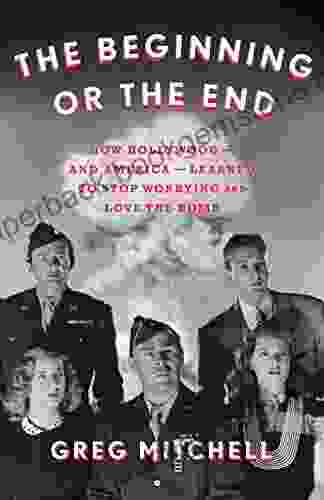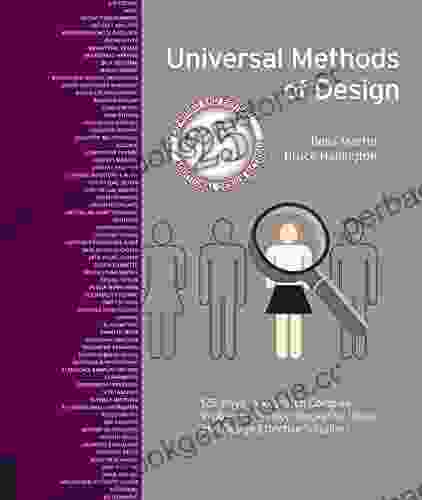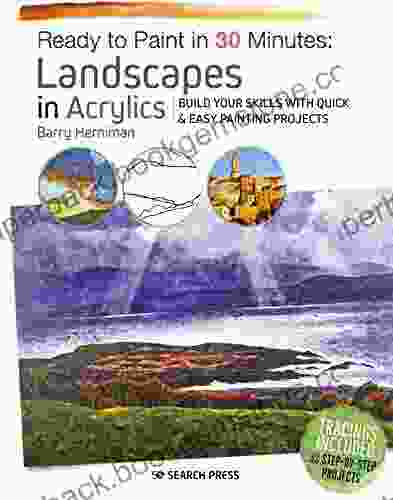How Hollywood and America Learned to Stop Worrying and Love the Bomb

The dawn of the atomic age in the aftermath of World War II cast a long shadow over American society, fueling widespread fear and anxiety about the potential for nuclear war. However, as the Cold War dragged on, a curious shift occurred: Hollywood and the American public gradually learned to adapt to the nuclear threat, even embracing it in some ways. This article explores the complex and multifaceted relationship between Hollywood, the American public, and nuclear weapons during this era, examining how the entertainment industry both reflected and shaped public attitudes towards nuclear warfare.
4.3 out of 5
| Language | : | English |
| File size | : | 3283 KB |
| Text-to-Speech | : | Enabled |
| Enhanced typesetting | : | Enabled |
| X-Ray | : | Enabled |
| Word Wise | : | Enabled |
| Print length | : | 290 pages |
| Screen Reader | : | Supported |
The Early Years: Fear and Anxiety
In the immediate aftermath of the atomic bombings of Hiroshima and Nagasaki, Hollywood films and television shows reflected the deep-seated fear and anxiety that gripped the American public. Films such as "The Beginning or the End" (1947) and "On the Beach" (1959) depicted the devastating consequences of nuclear war, while television shows like "The Twilight Zone" often featured episodes that explored the psychological and social effects of the nuclear threat.
During this period, Hollywood also produced a number of films that promoted civil defense measures, such as "Duck and Cover" (1951) and "The Atomic Cafe" (1982). These films emphasized the importance of preparing for and surviving a nuclear attack, reinforcing the sense of fear and vulnerability that permeated American society.
The Shift: Comfort and Escapism
As the Cold War continued, however, a gradual shift occurred in Hollywood's portrayal of nuclear weapons. Films and television shows began to downplay the threat of nuclear war, instead focusing on themes of comfort and escapism. Films such as "The Day the Earth Stood Still" (1951) and "Forbidden Planet" (1956) offered hopeful messages about the possibility of peaceful coexistence between humans and aliens, while television shows like "Leave it to Beaver" and "The Andy Griffith Show" provided a comforting vision of American life that seemed untouched by the nuclear threat.
This shift in tone reflected a growing sense of resignation and acceptance among the American public. While the fear of nuclear war never fully dissipated, people began to adapt to the idea of living with the threat. Hollywood's entertainment offerings provided a welcome distraction from the anxieties of the Cold War, offering a sense of comfort and escapism.
The Embrace: Nuclear Weapons as Entertainment
In the 1960s and 1970s, Hollywood's portrayal of nuclear weapons took a more overt turn, with films and television shows embracing nuclear weapons as a source of entertainment. Films such as "Dr. Strangelove or: How I Learned to Stop Worrying and Love the Bomb" (1964) and "The Bedford Incident" (1965) satirized the nuclear arms race and the absurdity of nuclear war. Television shows like "The Man from U.N.C.L.E." and "Mission: Impossible" featured high-stakes adventures that often involved nuclear weapons, treating them as a thrilling and exciting element of the plot.
This embrace of nuclear weapons as entertainment reflected a growing sense of complacency among the American public. The threat of nuclear war had become so normalized that it was no longer seen as a taboo subject. Instead, it was treated as a source of excitement and intrigue, providing a thrilling backdrop for stories of adventure and intrigue.
The Legacy
The relationship between Hollywood, the American public, and nuclear weapons during the Cold War era is a complex and fascinating one. Hollywood's films and television shows both reflected and shaped public attitudes towards nuclear warfare, offering a window into the fears, anxieties, and hopes of a nation living under the shadow of the bomb.
While the fear of nuclear war never fully subsided, Hollywood's portrayal of nuclear weapons evolved over time, from fear and anxiety to comfort and escapism to outright embrace. This evolution reflects the changing attitudes of the American public, who gradually adapted to the nuclear threat, even learning to find comfort and entertainment in it.
The legacy of this era continues to shape our understanding of nuclear weapons today. The images and narratives created by Hollywood during the Cold War have become deeply ingrained in our collective consciousness, influencing our perceptions of nuclear war and shaping our attitudes towards nuclear disarmament. Whether we are aware of it or not, Hollywood's portrayal of nuclear weapons has left an enduring mark on our culture and our understanding of this complex and dangerous technology.
4.3 out of 5
| Language | : | English |
| File size | : | 3283 KB |
| Text-to-Speech | : | Enabled |
| Enhanced typesetting | : | Enabled |
| X-Ray | : | Enabled |
| Word Wise | : | Enabled |
| Print length | : | 290 pages |
| Screen Reader | : | Supported |
Do you want to contribute by writing guest posts on this blog?
Please contact us and send us a resume of previous articles that you have written.
 Best Book
Best Book Page Flip
Page Flip Bookshelf
Bookshelf Literary loom
Literary loom Chapter
Chapter Bookish
Bookish PageTurner
PageTurner Bibliophile
Bibliophile Story
Story Inkwell
Inkwell Bookworm
Bookworm Labyrinth
Labyrinth Plot Twist
Plot Twist Prose
Prose Paperback
Paperback Storyteller
Storyteller Sanctuary
Sanctuary Fiction
Fiction Reading
Reading Chronicle
Chronicle Read
Read Betsy Dillard Stroud
Betsy Dillard Stroud Ben Hannam
Ben Hannam Robert E Hampson
Robert E Hampson Darrel Rees
Darrel Rees Stephen Boss
Stephen Boss Barack Obama
Barack Obama Greg Mitchell
Greg Mitchell Mariana Atencio
Mariana Atencio Milind Mulick
Milind Mulick Jon Contino
Jon Contino Glynn Stewart
Glynn Stewart Helmut Kopka
Helmut Kopka Mary Brave Bird
Mary Brave Bird Blaise Corvin
Blaise Corvin Yoshitaka Amano
Yoshitaka Amano Joanne Hutchinson
Joanne Hutchinson Eric Rauchway
Eric Rauchway Jessica Marting
Jessica Marting Elissa Washuta
Elissa Washuta James Haddock
James Haddock Barbie Scott
Barbie Scott Keith Doyle
Keith Doyle Barbara Bradley
Barbara Bradley Bassey Ikpi
Bassey Ikpi Richard L Leza Sr
Richard L Leza Sr Ibl Press
Ibl Press Gillian Gloyer
Gillian Gloyer Maggie Ramsay
Maggie Ramsay John Ruskin
John Ruskin Ben Street
Ben Street Benjamin Lewin
Benjamin Lewin Ian J Malone
Ian J Malone Mark Crilley
Mark Crilley Hayao Miyazaki
Hayao Miyazaki Billie Holiday
Billie Holiday F Scott Fitzgerald
F Scott Fitzgerald Sir Richard Francis Burton
Sir Richard Francis Burton Baoshu
Baoshu Steve Ryfle
Steve Ryfle Helen Thorpe
Helen Thorpe Harvey Arden
Harvey Arden Clifford D Simak
Clifford D Simak Charlise Lyles
Charlise Lyles Barney Nelson
Barney Nelson Nick Petrie
Nick Petrie Wesley Jones
Wesley Jones Chris Roel
Chris Roel Sandra Duran Wilson
Sandra Duran Wilson Sarah Hepola
Sarah Hepola Kevin Hart
Kevin Hart Lucee Joie
Lucee Joie Lauren Meisner
Lauren Meisner Billie Rae Bates
Billie Rae Bates Barbara Casey
Barbara Casey J Dominique
J Dominique Lynne Olson
Lynne Olson Daniel Rachel
Daniel Rachel Benjamin Hochman
Benjamin Hochman Robert Muirhead
Robert Muirhead John E Siers
John E Siers Ruth Superhal
Ruth Superhal Dori Jones Yang
Dori Jones Yang Betsy Beier
Betsy Beier Joseph Heywood
Joseph Heywood C J Boyle
C J Boyle Maurice Samuels
Maurice Samuels Tiana Laveen
Tiana Laveen Terry Lee Stone
Terry Lee Stone Partha Mitter
Partha Mitter Bac Hoai Tran
Bac Hoai Tran D A Miller
D A Miller Tammy Ruggles
Tammy Ruggles Brandon Varnell
Brandon Varnell Birgit O Connor
Birgit O Connor Charles A Perrone
Charles A Perrone Ceidrik Heward
Ceidrik Heward Stephen Mills
Stephen Mills Nefertiti Austin
Nefertiti Austin Jennifer Wilson
Jennifer Wilson Bella Young
Bella Young Robert Morkot
Robert Morkot Tim Stokes
Tim Stokes Chevonne Clarke Bryan
Chevonne Clarke Bryan Iris Murdoch
Iris Murdoch Individual Way
Individual Way S L Rowland
S L Rowland Bebe Harper
Bebe Harper Jamie Carter
Jamie Carter Jason Sperb
Jason Sperb Katja Petrowskaja
Katja Petrowskaja Ashley Jaquavis
Ashley Jaquavis Ian Mcdonald
Ian Mcdonald Jack Finney
Jack Finney Katie Dowe
Katie Dowe Benjamin John Coleman
Benjamin John Coleman Ben J Harris
Ben J Harris Bella Martin
Bella Martin Ros Per
Ros Per Jpinsiders
Jpinsiders Mary Lou Andre
Mary Lou Andre Elena Gorokhova
Elena Gorokhova William Alexander
William Alexander Barbara A Parish
Barbara A Parish Barbara Davis
Barbara Davis Matt Smith
Matt Smith Paula Kamen
Paula Kamen Benj Pasek
Benj Pasek Marie Beardmore
Marie Beardmore Michael Winter
Michael Winter Denis Dutton
Denis Dutton Lisa Congdon
Lisa Congdon David Byrne
David Byrne David E Lowe
David E Lowe Briana Wiles
Briana Wiles Loring M Danforth
Loring M Danforth Michael Shaara
Michael Shaara Margaret Kessler
Margaret Kessler Diane Duane
Diane Duane Dave Hickey
Dave Hickey James S A Corey
James S A Corey Bruce Hanington
Bruce Hanington Tessa Miller
Tessa Miller Tove Ditlevsen
Tove Ditlevsen Tiana Bighorse
Tiana Bighorse Betty Dooley Awbrey
Betty Dooley Awbrey George H Gisser
George H Gisser Gavin Maxwell
Gavin Maxwell Brad Bussie
Brad Bussie Richard Sorger
Richard Sorger Bob Leszczak
Bob Leszczak Diane Tuckman
Diane Tuckman Jane L Rosen
Jane L Rosen Tony Horwitz
Tony Horwitz Khadijah J
Khadijah J Lexi Sundell
Lexi Sundell Yvonne Blackwood
Yvonne Blackwood B V Larson
B V Larson Kenya Hunt
Kenya Hunt Jenna Fischer
Jenna Fischer Lena Corwin
Lena Corwin Orestes Lorenzo
Orestes Lorenzo Conn Iggulden
Conn Iggulden Bernice Lerner
Bernice Lerner Lorraine De Meaux
Lorraine De Meaux Elaine A Clark
Elaine A Clark Alan O Brien
Alan O Brien Valerie L Winslow
Valerie L Winslow Stewart M Green
Stewart M Green Jenny Mckay
Jenny Mckay Wendy Tait
Wendy Tait Becky Chambers
Becky Chambers Robin Cormack
Robin Cormack Paraluman S Aspillera
Paraluman S Aspillera Deirdre Slattery
Deirdre Slattery Michael Doyle
Michael Doyle Terry Compton
Terry Compton Robert Lanz
Robert Lanz Patrick Symmes
Patrick Symmes Melissa Rivers
Melissa Rivers Shing Schih
Shing Schih Marina Warner
Marina Warner Hal Erickson
Hal Erickson Nathalie Kalbach
Nathalie Kalbach Bernice L Mcfadden
Bernice L Mcfadden Tom Wiener
Tom Wiener Bob Drury
Bob Drury Laura Furman
Laura Furman Edward Gibbon
Edward Gibbon John Scarne
John Scarne Terry Pratchett
Terry Pratchett Susan Herrmann Loomis
Susan Herrmann Loomis Dalili
Dalili Hakeem M Oluseyi
Hakeem M Oluseyi Leon Smith
Leon Smith Paul Kendall
Paul Kendall Beryl Markham
Beryl Markham Tori Rodriguez
Tori Rodriguez Koloman Moser
Koloman Moser Sergio Toppi
Sergio Toppi Barrington Barber
Barrington Barber Mary Peters
Mary Peters Diane Gensler
Diane Gensler Bethany C Morrow
Bethany C Morrow Nolan Clark
Nolan Clark Umm Zakiyyah
Umm Zakiyyah Suzette Riddick
Suzette Riddick Theo Farrington
Theo Farrington Peter Inglis
Peter Inglis Veda Austin
Veda Austin Sara Boccaccini Meadows
Sara Boccaccini Meadows Barry Kirwan
Barry Kirwan Ben Box
Ben Box Mackenzie Phillips
Mackenzie Phillips Josephine B Pasquarello
Josephine B Pasquarello Steve Huston
Steve Huston Tony Burton
Tony Burton Joseph Lanza
Joseph Lanza Lowell Angell
Lowell Angell Brent Eviston
Brent Eviston Barry Sonnenfeld
Barry Sonnenfeld Bley Hack
Bley Hack Maggie Craft
Maggie Craft Charlotte Fiell
Charlotte Fiell Joan Reardon
Joan Reardon Yahrah St John
Yahrah St John Stephanie Claytor
Stephanie Claytor Sophia Rolle
Sophia Rolle Sophie Cunningham
Sophie Cunningham Lucy Jane Bledsoe
Lucy Jane Bledsoe Jonathan Waterman
Jonathan Waterman Saxon Andrew
Saxon Andrew Beebe Bahrami
Beebe Bahrami Ian Nathan
Ian Nathan Tyler Perry
Tyler Perry Talia Hibbert
Talia Hibbert Nancy Kress
Nancy Kress Beatrice Sonders
Beatrice Sonders John Muir
John Muir Bobby Brown
Bobby Brown Greg O Brien
Greg O Brien Benjamin Drake
Benjamin Drake Michael Haag
Michael Haag Chris Nashawaty
Chris Nashawaty Michael Anderle
Michael Anderle Nelson Demille
Nelson Demille Basil Johnston
Basil Johnston Roman Mars
Roman Mars Gerri Leen
Gerri Leen Matthew Morgante
Matthew Morgante Robert Roskind
Robert Roskind Silvia Marina Arrom
Silvia Marina Arrom Ben Coes
Ben Coes Noret Flood
Noret Flood Tim W Jackson
Tim W Jackson Deborah Forman
Deborah Forman Vanessa Zoltan
Vanessa Zoltan Theda Perdue
Theda Perdue Benjamin E Wise
Benjamin E Wise Tim Powers
Tim Powers Barry Moser
Barry Moser Marvin Patchen
Marvin Patchen Sheila Montilla
Sheila Montilla Dan Moren
Dan Moren Matthew J Milliner
Matthew J Milliner Jacinda Townsend
Jacinda Townsend Linda Lael Miller
Linda Lael Miller Interweave Editors
Interweave Editors Baby Professor
Baby Professor Helen Hoang
Helen Hoang John H Vanderpoel
John H Vanderpoel Mark Tufo
Mark Tufo Ella Frances Sanders
Ella Frances Sanders Shirtaloon
Shirtaloon Robert Henderson
Robert Henderson Rexford Govorchin
Rexford Govorchin Ilan Stavans
Ilan Stavans Carol Sulcoski
Carol Sulcoski Michael Wise
Michael Wise Dean Koontz
Dean Koontz Betty Halbreich
Betty Halbreich Sarah Mirk
Sarah Mirk Bj Wane
Bj Wane Kerry Bogert
Kerry Bogert Poppy Evans
Poppy Evans Thomas P Stafford
Thomas P Stafford Jane Pek
Jane Pek Jennifer Sewing
Jennifer Sewing Bev Sellars
Bev Sellars John Howard Griffin
John Howard Griffin Jessie Knadler
Jessie Knadler Bolu Babalola
Bolu Babalola Rosemary Kimani
Rosemary Kimani Ben Eastham
Ben Eastham Yiyun Li
Yiyun Li Michael Mammay
Michael Mammay Kolbie Blume
Kolbie Blume Bill Winner
Bill Winner James Ulyatt
James Ulyatt Bob Normand
Bob Normand Harmon Cooper
Harmon Cooper Dennis E Taylor
Dennis E Taylor William A Kappele
William A Kappele Blair Howard
Blair Howard Emily Spivack
Emily Spivack Mario Rizzi
Mario Rizzi George Lopez
George Lopez Staci Swider
Staci Swider Claude Lanzmann
Claude Lanzmann Joan Williams
Joan Williams Mateo Askaripour
Mateo Askaripour Zora O Neill
Zora O Neill Lonely Planet
Lonely Planet Ben Strand
Ben Strand Maxime J Durand
Maxime J Durand Beth Tondreau
Beth Tondreau Sarah Birnbach
Sarah Birnbach Momoyo Nishimura
Momoyo Nishimura Tya Marie
Tya Marie Jonathan C Slaght
Jonathan C Slaght Jonathan Lopez
Jonathan Lopez Ruth Silvestre
Ruth Silvestre Barbara Raue
Barbara Raue D L Harrison
D L Harrison Wayne Larsen
Wayne Larsen Nikki Turner
Nikki Turner Ellen Tomaszewski
Ellen Tomaszewski Betsy Prioleau
Betsy Prioleau Stephen Haff
Stephen Haff Ruby Dixon
Ruby Dixon Ben Corbett
Ben Corbett Lesley Downer
Lesley Downer William Black
William Black Bill H Myers
Bill H Myers Rainer Maria Rilke
Rainer Maria Rilke Barry Lord
Barry Lord Matthew Brehm
Matthew Brehm Bill Cotter
Bill Cotter Debbie Rose Myers
Debbie Rose Myers Jan V White
Jan V White Hildegarde Mahoney
Hildegarde Mahoney Brad Taylor
Brad Taylor Wassily Kandinsky
Wassily Kandinsky James Joyce
James Joyce Robert Crais
Robert Crais Leo Buijs
Leo Buijs Ian Chilvers
Ian Chilvers Catherine Ryan Hyde
Catherine Ryan Hyde Grace Berry
Grace Berry Rebecca Sugar
Rebecca Sugar Brad Lee
Brad Lee Thomas S Hischak
Thomas S Hischak Louis Wain
Louis Wain Florencia E Mallon
Florencia E Mallon Bengie Molina
Bengie Molina Behrouz Boochani
Behrouz Boochani Boris Mihailovic
Boris Mihailovic Ben Shahn
Ben Shahn Michael J Hayde
Michael J Hayde Bill Lee
Bill Lee Chad Zunker
Chad Zunker Shane Mitchell
Shane Mitchell Noel Riley Fitch
Noel Riley Fitch Phoebe Robinson
Phoebe Robinson Bernth Lindfors
Bernth Lindfors Spencer Shaw
Spencer Shaw Jay Armstrong
Jay Armstrong Kyle Froman
Kyle Froman Bil Donovan
Bil Donovan Jules Verne
Jules Verne C Pierce Salguero
C Pierce Salguero Jamie Davis
Jamie Davis Bich Minh Nguyen
Bich Minh Nguyen Ulysses S Grant
Ulysses S Grant Elisabeth Elliot
Elisabeth Elliot Terese Marie Mailhot
Terese Marie Mailhot Donald N Thompson
Donald N Thompson Dana Fox
Dana Fox Faye Kellerman
Faye Kellerman Beverly J Armento
Beverly J Armento Fania E Davis
Fania E Davis Wilkie Collins
Wilkie Collins J C Sum
J C Sum Beverly Jenkins
Beverly Jenkins Justin Woolley
Justin Woolley Bill Plympton
Bill Plympton Stuart D Paine
Stuart D Paine Bonny Snowdon
Bonny Snowdon Carol Huber Cypher
Carol Huber Cypher Ernst Rettelbusch
Ernst Rettelbusch Tershia Lambrechts
Tershia Lambrechts Hope Hart
Hope Hart Lucy Adlington
Lucy Adlington Becky Stephen
Becky Stephen Zachary Leader
Zachary Leader Barbara Chase Riboud
Barbara Chase Riboud Kayla Arora
Kayla Arora Ravyn Wilde
Ravyn Wilde Barbara Miller
Barbara Miller Jeremy Dronfield
Jeremy Dronfield Eva Tulene Watt
Eva Tulene Watt Marie Killilea
Marie Killilea Brian Burke
Brian Burke Lori Wilde
Lori Wilde Patricia Sands
Patricia Sands Bella Blair
Bella Blair Norman Lee
Norman Lee Bill Bensley
Bill Bensley Barry Herniman
Barry Herniman Stephen C Baldwin
Stephen C Baldwin Dean A Kowalski
Dean A Kowalski Jordan Marie
Jordan Marie Jennie Smallenbroek
Jennie Smallenbroek Esmeralda Santiago
Esmeralda Santiago Bonny Pierce Lhotka
Bonny Pierce Lhotka Charles Sturt
Charles Sturt David Elliot Cohen
David Elliot Cohen Elisabeth Stevens
Elisabeth Stevens Olive Yong
Olive Yong Mitche Graf
Mitche Graf Laney Salisbury
Laney Salisbury Leanne Kitchen
Leanne Kitchen Dave Hill
Dave Hill Bonnie Barker
Bonnie Barker Steven Campbell
Steven Campbell Joseph Doddridge
Joseph Doddridge Kathy Mckeon
Kathy Mckeon Gabrielle Euvino
Gabrielle Euvino Barbara Lewis
Barbara Lewis Steve Berry
Steve Berry Edward White
Edward White Barbara Hambly
Barbara Hambly Kao Kalia Yang
Kao Kalia Yang Eddie Chambers
Eddie Chambers Kristen Dutkiewicz
Kristen Dutkiewicz Eliot Greenspan
Eliot Greenspan Blakely Little
Blakely Little Joseph M Henninger
Joseph M Henninger Matthew Luzi
Matthew Luzi Tracey Lange
Tracey Lange Deanne Stillman
Deanne Stillman Malala Yousafzai
Malala Yousafzai Barbara Demick
Barbara Demick Ea Hooper
Ea Hooper Barbara Grizzuti Harrison
Barbara Grizzuti Harrison Collins Dictionaries
Collins Dictionaries Laura Ling
Laura Ling Seymour Morris Jr
Seymour Morris Jr Phillip Maisel
Phillip Maisel Bianca Del Rio
Bianca Del Rio Keith Houston
Keith Houston Gabrielle Hamilton
Gabrielle Hamilton Michael Chatfield
Michael Chatfield James Goddard
James Goddard Taylor Jenkins Reid
Taylor Jenkins Reid Mike Curato
Mike Curato Saul Tanpepper
Saul Tanpepper Tom Sito
Tom Sito Pam Flowers
Pam Flowers Stanislaw Lem
Stanislaw Lem Lucinda Fleeson
Lucinda Fleeson Sejal Shah
Sejal Shah Douglas Brooke Wheelton Sladen
Douglas Brooke Wheelton Sladen Bet Borgeson
Bet Borgeson Philip B Meggs
Philip B Meggs Bob Dow
Bob Dow Fiona Peart
Fiona Peart Maura Spiegel
Maura Spiegel Beau Riffenburgh
Beau Riffenburgh Tim Rayborn
Tim Rayborn Bob Martin
Bob Martin Bandana Ojha
Bandana Ojha Ken Browar
Ken Browar Linda Nochlin
Linda Nochlin Philip Guston
Philip Guston Toni Ann Johnson
Toni Ann Johnson Eric Henze
Eric Henze Cornelius C Kubler
Cornelius C Kubler Ben D Over
Ben D Over Betsy Whyte
Betsy Whyte Peter Ustinov
Peter Ustinov Tim Rangnow
Tim Rangnow Monica Walters
Monica Walters David Fisher
David Fisher Larissa Pham
Larissa Pham Zongyan Hu
Zongyan Hu Bette Howland
Bette Howland Lynne Anne Blom
Lynne Anne Blom David Airey
David Airey Wayne Moniz
Wayne Moniz Ebony Diamonds
Ebony Diamonds Shanora Williams
Shanora Williams Philip Ball
Philip Ball Stuart Williams
Stuart Williams William Ellis
William Ellis Bill Arnott
Bill Arnott William Lidwell
William Lidwell Charlie Jane Anders
Charlie Jane Anders Shoko Tendo
Shoko Tendo Barbara Totaro
Barbara Totaro Barbara Delinsky
Barbara Delinsky Colin Falconer
Colin Falconer Laurie Gough
Laurie Gough Micah Ian Wright
Micah Ian Wright Doug Risner
Doug Risner Bill Bryson
Bill Bryson Rita Benn
Rita Benn Jonathan Strahan
Jonathan Strahan George Schindler
George Schindler Rohan M Vider
Rohan M Vider Basilius Besler
Basilius Besler James Grady
James Grady Merl Code
Merl Code Bob Elliott
Bob Elliott Blake Farha
Blake Farha Eric Gibson
Eric Gibson Bob Dennard
Bob Dennard Russell Foureagles
Russell Foureagles Christopher Butler
Christopher Butler Gary Wasserman
Gary Wasserman Ottessa Moshfegh
Ottessa Moshfegh John Mulholland
John Mulholland Mary Matsuda Gruenewald
Mary Matsuda Gruenewald Tom Wilson
Tom Wilson Jodi Staniunas Hopper
Jodi Staniunas Hopper Samuel Peralta
Samuel Peralta Erica Davies
Erica Davies Dan Dietz
Dan Dietz Bob Herbert
Bob Herbert Becky Gilhespie
Becky Gilhespie David V Jervis
David V Jervis Bayard Taylor
Bayard Taylor Marty Noble
Marty Noble Bart King
Bart King J P Telotte
J P Telotte Hillary Jordan
Hillary Jordan Paul S Leland
Paul S Leland John Seed
John Seed John G Breslin
John G Breslin Simon Turney
Simon Turney Laurent Bolard
Laurent Bolard
Light bulbAdvertise smarter! Our strategic ad space ensures maximum exposure. Reserve your spot today!
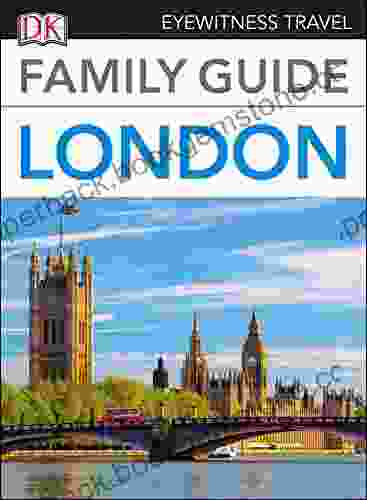
 Nikolai GogolDK Eyewitness Family Guide London: Your Essential Travel Companion for an...
Nikolai GogolDK Eyewitness Family Guide London: Your Essential Travel Companion for an...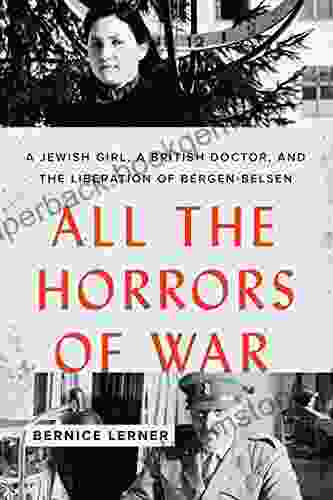
 Donovan CarterThe Jewish Girl, British Doctor, and the Liberation of Bergen-Belsen: A Story...
Donovan CarterThe Jewish Girl, British Doctor, and the Liberation of Bergen-Belsen: A Story... Ruben CoxFollow ·4.4k
Ruben CoxFollow ·4.4k Robert FrostFollow ·18.7k
Robert FrostFollow ·18.7k Brent FosterFollow ·2.7k
Brent FosterFollow ·2.7k Griffin MitchellFollow ·9.8k
Griffin MitchellFollow ·9.8k Drew BellFollow ·6.9k
Drew BellFollow ·6.9k Willie BlairFollow ·14.2k
Willie BlairFollow ·14.2k Joel MitchellFollow ·19.3k
Joel MitchellFollow ·19.3k Alan TurnerFollow ·4.6k
Alan TurnerFollow ·4.6k
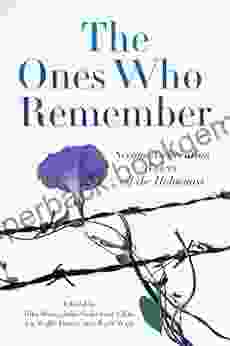
 Bryan Gray
Bryan GrayThe Second Generation: Voices of the Holocaust
The Holocaust was one of the most horrific...

 Douglas Foster
Douglas FosterWalking the Fields of the Newfoundland Dead
In the heart of the rolling countryside of...
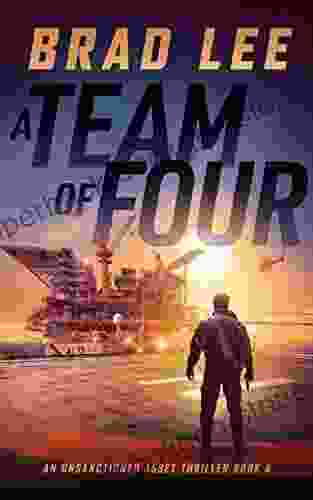
 Henry James
Henry JamesThe Unsanctioned Asset: A Gripping Thriller Set in a...
In the realm of espionage thrillers, The...
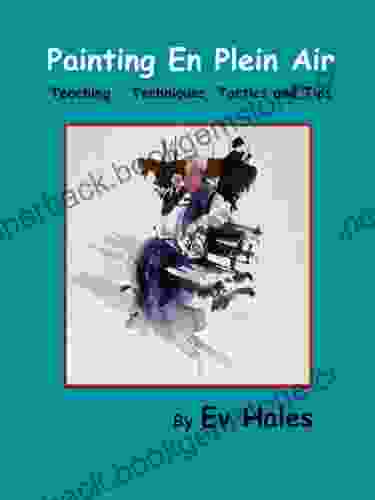
 Devon Mitchell
Devon MitchellPainting En Plein Air: Capturing the Essence of Nature on...
Painting en plein air, or painting...
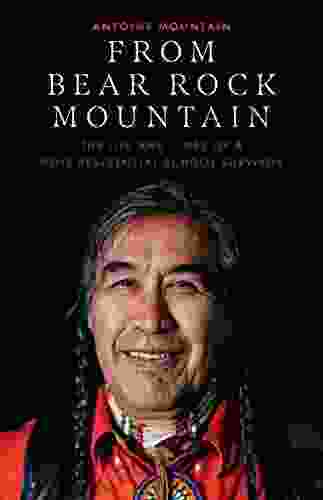
 Damon Hayes
Damon HayesThe Life and Times of Dene Residential School Survivor
Residential schools...
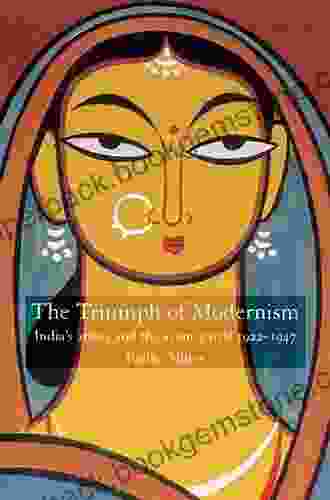
 Steve Carter
Steve CarterIndia Artists and the Avant Garde: 1922-1947
The term "avant-garde" is...
4.3 out of 5
| Language | : | English |
| File size | : | 3283 KB |
| Text-to-Speech | : | Enabled |
| Enhanced typesetting | : | Enabled |
| X-Ray | : | Enabled |
| Word Wise | : | Enabled |
| Print length | : | 290 pages |
| Screen Reader | : | Supported |


